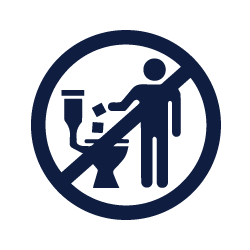
Where does your water go after you flush the toilet, empty the sink, take a shower or do laundry? Wastewater drains into the communitie's sanitary sewer system. The sanitary sewer system is an underground network of pipes that leads to the wastewater treatment plant (WWTP). Sewers are designed to take away used dirty water from sinks, baths, showers, laundries, and toilets. Flushing away "unflushables" adds to the cost of operating and maintaining your sewers and the wastewater treatment plant. Putting trash down the toilet does cause blockages in sewers and possible damage to the environment.
"Disposable" doesn't mean flushable. Disposable means you should bag it and trash it... don't flush it! Most baby wipes and adult wipes are not flushable. This information is usually written in tiny letters somewhere on the package. Even if the phrase "flushable" or "safe to flush" is on the package, it may not be flushable. These "unflushable" and many "flushable" wipes do not fall apart in water like toilet paper. The wipes get tangled in the sewage with other wipes and debris, resulting in sewer clogs and expensive problems for your collection system / WWTP. These additional maintenance issues cost you money in the form of sewer rates and take time away from the operators and maintenance staff's daily activities. Flushing these items can impact you or your neighbor's sewer service.
| Examples of DO NOT Flush Items |
| baby wipes |
adult wipes |
paper towels |
disposable and cloth diapers |
| feminine products |
q-tips |
bandages |
dental floss |
| socks |
sanitary towels |
incontinence pads |
underwear |
| rags |
kitty litter |
cigarette butts |
panty hose
|
|
razors and blades- put these in a rigid container before placing in the trash bin
|
|
medicines- any unwanted or unused medicines should be returned to your local pharmacy for safe disposal
|
Thank you for considering the impact these items may have on your sanitary sewer system before you flush!